At 94, what has the world’s most-travelled naturalist learned? He
talks garden birds in lockdown, the eerie silence of Chernobyl – and
tackling the climate crisis
Before the stay-at-home orders of 2020 kept him in one place for months on end, David Attenborough had never sat in his garden and listened to the birds. Not properly, he says, not determinedly “swotting up with a notebook and keeping a bird list”. The foremost figure in natural-world broadcasting (so admired by naturalists around the planet, he has three types of plant as well as a spider, snail, grasshopper, frog, lizard, marsupial lion and shark-like fish named after him) hardly paid attention to the wildlife on his doorstep until lockdown forced his hand. From spring through to autumn, he says, he sat outside with a pencil and made a determined effort to identify every species he could hear. Blackbirds. Thrushes. Jays. Blue tits and great tits. Swifts.
“Actually, I couldn’t really hear the swifts,” the 94-year-old admits. Something to do with their pitch, and his failing ears. “My hearing,” Attenborough growls, using the breathy, mournful voice that often accompanies footage of an ageing alpha getting supplanted by a younger fitter animal, “is not what it was.”
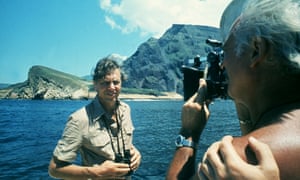
Back in his 30s and 40s, when Attenborough was regularly out in the field on five continents, shooting endless one-off nature programmes for the BBC, he wore a lot of khaki. In his 50s, presenting the genre-defining 13-episode series Life On Earth, he wore a shirt patterned in pink, the better to show off the lushness of a novel 1979 colour broadcast. Into his 89th year, he was prepared to wear rolled-up summer chinos and blue Crocs for a show about coral reefs. Today, sitting in his study at home in London, Attenborough’s outfit is more muted. Two curly pale shirt lapels escape from the collar of a brown sweater. Your eyes are drawn to the rightward sweep of flossy bright-white hair.
While he talks, Attenborough clutches spectacles, using these for emphasis – jabbing them in the direction of his garden, for instance, when discussing the elusive swifts, and later arcing them above his head to suggest a larger world and its troubles with global heating. We’re still on garden wildlife when he stops what he’s saying, suddenly, and points the specs in my direction.
“Have you got a garden?” he asks.
Er, a little one, I say.
“How many different kinds of birds do you think come to visit?”
He waits for an answer. And cruelly, because we’re talking over Zoom, I can see my own expression in this moment – a rictus of absolute panic. An on-the-spot nature quiz from Sir David Attenborough? It’s like finally meeting Cristiano Ronaldo, only to be challenged to a free-kick contest.
As well as all the animals and plants, the guy has a dinosaur, Attenborosaurus, named after him. His spare, musical voiceovers (he calls them “commentaries”) have soundtracked our teatimes and Sunday evenings for decades. His teddy-bear jowls, that hunch he does when explaining something interesting – these have been fundamental to the experience of watching television. In 2018, a YouGov poll named Attenborough the most popular person in the UK. He has always been a top-five imaginary dinner guest for me. So when he asks how many types of bird come to my garden, I wish more than anything that I could pull out a notebook and show him that I, too, have spent my lockdown noting down the visiting jays and thrushes, because to win his approval (a nod, a discreet hint that after this we might stay in touch) would be heaven.
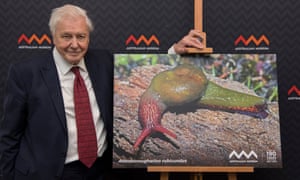
Attenborough’s is one of those jam-packed lives it’s impossible to do justice to in precis. Even if you just considered events since his 90th birthday (when a newly discovered dragonfly was named after him as a gift), the breadth of his achievement is astonishing. Fronting the nature series Blue Planet II, at 91, Attenborough scored the most-watched TV show of 2017. The same year, a constellation of stars was named after him. At 92, he was a keynote speaker at the UN’s climate change conference in Poland, and was later interviewed by Prince Williams at Davos. Our Planet, a nature series he worked on for Netflix, had been streaming online for a month when he turned 93, viewed 33m times worldwide. He played Glastonbury, lecturing from the Pyramid stage about the climate crisis, and in among all this Attenborough took a trip to one of the strangest and most eccentric destinations in a long career of foreign travel.
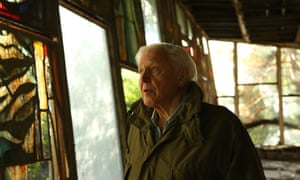
“Chernobyl,” he growls, folding his arms. He was flown to the abandoned Ukrainian city by the film-makers he has collaborated with for years. They were there to shoot scenes for a stand-alone film, A Life On Our Planet, which broadcast on Netflix in October and opened with a startling visual of Attenborough picking his way through an empty schoolroom. He says he was struck by the hush of the place. “I didn’t hear a bird, I didn’t hear a grasshopper. I’m still not sure what to make of that.”
Wildlife photographers had been working in Chernobyl for years, setting up camera traps and trying to capture footage of the animals that had started to roam around the uninhabited city. “Wild horses. Foxes. I didn’t see any of them myself,” Attenborough says. “I just remember that silence.”
The school he was taken to had been left untouched since the city was evacuated more than 30 years ago. “There were children’s notebooks, lying on the floor there, half-completed in Russian. Of course, you thought of the child that had been writing in that book, only suddenly to be dragged away.”
I still recall like yesterday the feeling of being a young man. I feel exactly the same
After Chernobyl, Attenborough was taken to Kenya to film with wildebeest. These were some of his last trips before a locked-down 2020 and he says he’s grateful, as well, that he got the opportunity to film in the Leicestershire countryside where he came of age as a teenage fossil-hunter in the 30s. “The team were nice enough to take me back to the same disused quarry where I once collected my fossils. Mm, some lovely fossils there. When we visited I was rather distressed to see all the rock was overwhelmed by vegetation.”
He means: because this stopped him being able to roll up his sleeves, in his 10th decade, and do some fossil hunting. “I still collect fossils. Still get as much pleasure out of them. I can recall like yesterday the feeling of being a young man, that wonderful pleasure in knocking a rock open to see one inside.”
As part of A Life On Our Planet – easily Attenborough’s most personal documentary to date – he reviewed old footage of himself as a greenhorn nature broadcaster. Watching it back, what did he make of his younger self?
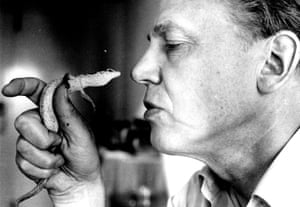
He barks out a laugh and gives an answer that recalls other conversations I’ve had about ageing with astonishingly youthful ninetysomethings. “I thought, in my own mind, I haven’t changed,” he says. “I feel exactly the same.”
Attenborough was in his mid-20s when he started in telly. He had studied natural sciences at Cambridge, and it was there he met his future wife, Jane Oriel. (They would be married for almost half a century until her death in 1997.) His joining of the BBC’s natural history department coincided, fortuitously, with the expansion of commercial air travel. If he wanted to feature some exotic creature (a pygmy sloth, a scaly anteater), he could pitch for the budget and jump on a plane. By the middle of the 60s, he was not only well-known as an on-camera host, but had power behind the scenes, first as controller for BBC Two, then as director of programming for BBC One and BBC Two.
He gave up the corporate responsibilities in the 70s. Top-to-toe in khaki, he set off for Papua New Guinea to make a programme about an uncontacted tribe. It was the first of many trips that decade. By 1979, he had clocked up 1.5m miles, visiting 39 countries and filming 650 species for his monumental nature series Life On Earth. Millions watched. Two follow-ups, The Living Planet and The Trials Of Life, broadcast in 1984 and 1990, bookended Attenborough’s knighthood in 1985. His retirement was discussed internally at the BBC as early as 1990. But neither he nor his bosses pulled the trigger and he slipped sideways into a role that has lasted ever since.
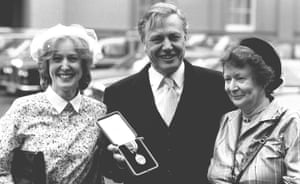
Essentially, he has lent his voice to lots of wildlife documentaries (two or three a year), while having less of a hand in crafting them. “People still give me credit,” he says. “Credit I simply don’t earn.”
For the blockbuster documentaries such as 2001’s Blue Planet and 2006’s Planet Earth, and their 2017 and 2016 sequels, he would still be taken to visually interesting, sometimes risky places to record vignettes. He had become a kind of ambassador, not only for the sumptuousness of the natural world, but for the art of filming and editing it.
Critics have questioned what sort of ambassador he has been for the natural world as it really exists, outside of the perfectly edited TV show. Last year, the naturalist Richard Mabey told the Guardian that, as a viewer, he had been concerned as early as 1979 that Attenborough’s planet Earth “wasn’t a place I recognised… like an idealised biosphere on another planet.”
He had asked Attenborough about this once, he said, and been told: “We wouldn’t have got the viewers, they would have turned off.”
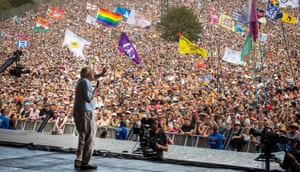
He has never made a secret of his desire to maximise audience numbers. But there have been conspicuous, belated changes to the tone of the documentaries he fronts. There will be grim sequences, even whole episodes that detail the damage humans are doing to the natural world. Attenborough credits his long-term collaborator Alastair Fothergill for this change. “He broadened the whole picture, [so we were] making natural history films not only because it’s fun, but because there’s a sense of vocation, too.”
Fothergill, who’d first worked with Attenborough on The Trials Of Life and later became head of the BBC’s natural history unit, co-founded the production company Silverback Films in 2012. It’s been Silverback, ever since, that makes most of the shows we associate with Attenborough. When I ask if he had an influence in the changing moral tone of these programmes, Attenborough says no: that would be to offer him more credit he hasn’t earned. But he supports their ethos, “which is to make films that will convince people about ecological problems. It’s that that drives them. I admire what they’re doing very much.”
"It can’t all be selfish, it can’t all be grab-grab-grab. The Earth and its oceans are finite"
As the programmes have become politicised, though, so has Attenborough in his life away from TV. As a speaker at the UN climate change conference in Poland, he begged delegates to take action to prevent “the collapse of our civilisations”. The next UN conference, Cop26, due to take place in Glasgow last month, has been rescheduled for November 2021. As far as I’m aware, Attenborough has not yet been invited, but he clearly has an idea of what he will say if he is: he practises an impassioned, impromptu speech on me, swinging his spectacles as he gives the imaginary delegates a dressing-down.
“Because somebody’s gotta give,” he is saying, “it can’t all be selfish, it can’t all be grab-grab-grab. It can’t be that delegates in an international conference count their successes in terms of how much they’ve got from each other.”
Watching him on TV all my life, I’ve become so familiar with the voices he uses that I have assigned them different names. There’s his Chase Voice, pitch rising, pace quickening as a predator stalks its prey. There’s his Battle Voice, deep, staccato, for the times when lions or seals or giraffes come to blows. There are softer, relief-soaked tones to accompany footage of reprieve for a doomed animal – his Saved From The Jaws Of Death Voice. And there’s his Erupting Volcano Voice, loud, breaking, furious. He’s using the Volcano Voice now.
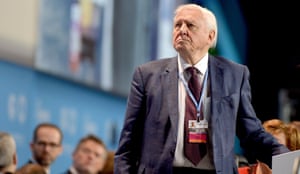
“We have to recognise that the Earth and its oceans are finite,” he says. “We have to recognise that in the past we have destroyed whole fisheries, herring, cod, just destroyed them. We need a plan… We need to show restraint. Mutual restraint. We have to know we aren’t always in competition with one another.”
In internal communiques at the BBC, they refer to him as SDA. On brass plaques outside the buildings he’s opened, the titled version of his name gets its full, seven-syllable airing. Tabloid writers like to call him Sir Att. In company, though, he’s always David. It’s a modesty thing. And if the modesty thing is an act, it’s one he has maintained around colleagues, members of the public and fly-by magazine interviewers for decades now. He is sweet, unassuming and boyish.
On the day we speak, he has just been hanging out, virtually, with long-term collaborators including Fothergill and veteran wildlife cameraman Matt Aeberhard. They have gathered for a web conference to talk about the BBC series A Perfect Planet, being broadcast this month, and it’s clear Attenborough takes great pleasure in ribbing his colleagues and being ribbed in turn. There’s a running joke about Fothergill trying to kill him (a bloody accident involving a diving board, while they were filming with dolphins in the Bahamas in the 80s) and another about Fothergill sending him to both of the Earth’s desolate poles in the space of a few weeks. When Fothergill’s internet connection fails, Attenborough gets in quick with a deadpan, “He’s frozen. Poor man.”
Aeberhard has logged in from a corrugated iron cabin in the Ugandan forest. It makes for quite a contrast to Attenborough’s shelves of dusty nature books, and while Aeberhard tells a story about travelling in a failing hovercraft over lethal salt flats, seeking a rare shot of Hawaiian volcano birds, I try to decipher Attenborough’s expression. He’s listening with a hand propped under his chin, the little finger curled over his mouth. As Aeberhard insists that he has a cool job, I’m wondering what the 94-year-old is feeling. Envy? Relief?
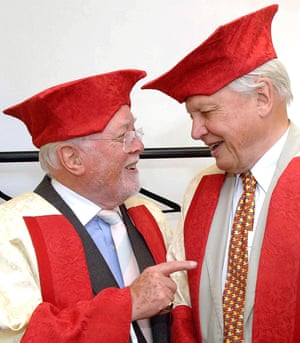
Later I ask him. He smiles and says he was relishing Aeberhard’s use of the word “cool” to describe something so dangerous. Genuinely tickled, he repeats the word a few times, trying it out, pronouncing it to rhyme with fuel. When he laughs, it’s a rising sound. Hee-ha-HA! He won’t address the question of envy or relief: in common with many men and women of his generation, Attenborough is neither eager nor eloquent when it comes to discussing his feelings.
When I ask what kind of comfort he has drawn, this long, lonely year, from the natural world – for instance, those birds in his garden – he answers impersonally. “It’s clinically established that a relationship with the natural world is very important psychologically, for our sociology, our mental health.”
And you? “We all know in our heart of hearts how important the natural world is,” he says. “It’s OK for me, I’ve got a garden. I think of those people who don’t. That deprivation. But if you’ve got a garden, and you’ve been forced to sit in it for some time because of Covid, you know how important it is.”
Attenborough’s colleagues had mentioned this dread that every wildlife film-maker feels, about an audience’s growing sense of “seen it, done it”. The wonders of the world are finite. They worry about staving off overfamiliarity and ennui. I ask him whether, at the age of 94, he ever worries about the same thing in his own life. Has he ever got to a stage of “seen it, done it”? And, if so, how has he maintained his curiosity, his exceptional and obvious life force?
The great man inhales. For an instant it seems there’s a real answer on his lips. He even uses one of his special documentary voices, the one I think of as Ruefully Wonderstruck, the sort of voice he uses to express some natural mystery that has never been satisfactorily explained by scientists. How do penguins know it’s time to march? How do herds remember their migration routes? Attenborough will often pose such questions and then answer, in a special, crackly voice that’s hardly above a whisper: “We… don’t know.”
“I… don’t know,” he says now, half in a whisper.
How does he stay buoyant? “I’ve been fantastically lucky, I suppose. I’ve been everywhere I’ve ever wanted to be. The riches I’ve seen. The pleasures that I’ve had. These things are overwhelming.”
Attenborough says that Fothergill and the others often tease him: come on, David, admit it, you can see that you’re unique. “They keep saying to me that I’m the most privileged chap in the world. They remind me that I probably have seen more of the natural world than almost anybody.”
So it’s gratitude, he seems to suggest, that keeps him positive. I tell him, at the end of such a difficult year, there are few people I’d rather ask for an optimistic thought on the future to come. We know there’s plenty to dread, and to set ourselves to changing. But what do we have to be hopeful about?
The climate conference next year will determine cause for any serious, immediate optimism, Attenborough says. More generally, he returns to his memories of that trip to Chernobyl. In many ways, he says, it was a desperate and frightening place. “But it wasn’t depressing, as far as I was concerned. And the lasting impression I took away was actually the resilience and fecundity of nature. I was expecting something like a volcanic plain, something desolate. Instead, inside the ruins of the city, there was this burgeoning of plant life.” Lush green plants. Towering trees. “The overwhelming feeling I had was that you can treat nature badly – and in this huge devastation that humanity created in Chernobyl, nature was treated very badly indeed. But nature came back.”
He closes his eyes and lowers his head. He uses his Saved From The Jaws Of Death Voice. “Quite extraordinary.”
• A Perfect Planet is out this month on BBC One.
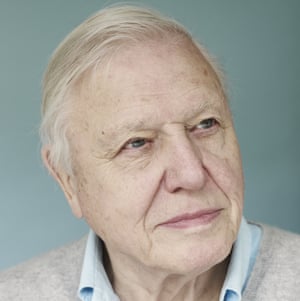
No comments:
Post a Comment